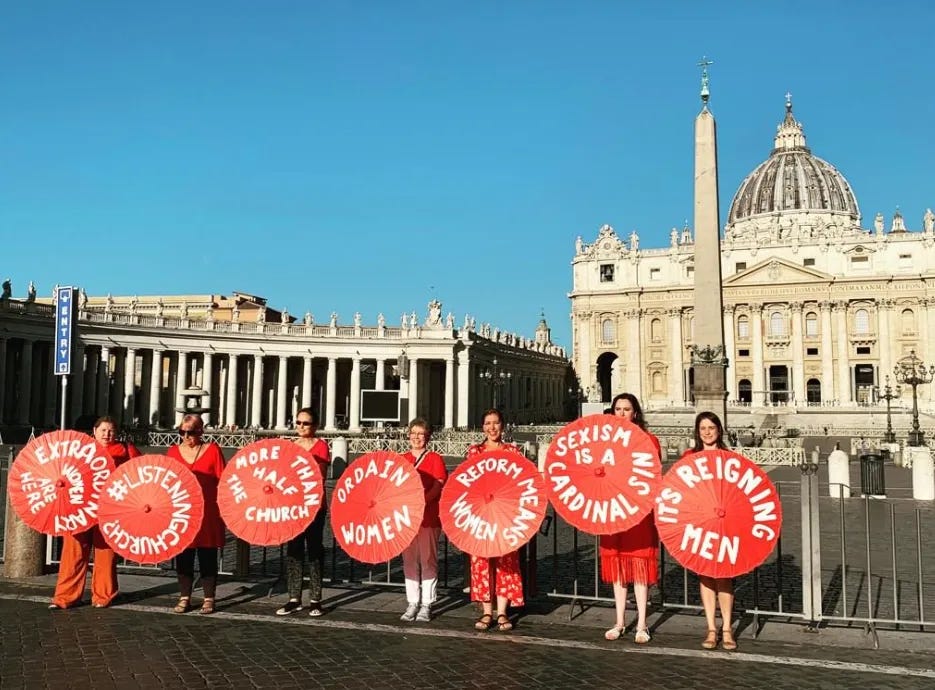Influential German Cardinal Calls for Ordaining Women As Deacons
"In a synodal Church, the era of clericalism and arbitrary decisions by bishops is over," Walter Kasper writes in his autobiography.

By Gary Gately
Cardinal Walter Kasper, an influential German theologian and former head of the Vatican’s ecumenism efforts, argues that the Catholic Church should ordain women as deacons, echoing the views of growing numbers of women in the 1.4 billion-member Church.
In his autobiography, Der Wahrheit auf der Spur (On the Trail of Truth), to be released in June, the 92-year-old Kasper wrote: “Women and men have the same dignity before God and must therefore be recognised with their own charisms…. We will continue to need good bishops and priests in the future, but in a synodal Church, the era of clericalism and arbitrary decisions by bishops is over.”
Synodality refers to the multi-year reform effort launched by Pope Francis to make the Church more inclusive, but the late pontiff had repeatedly ruled out ordaining women as deacons.
Kasper — who previously led the Vatican Council for Promoting Christian Unity (now the Dicastery for Promoting Christian Unity), which promotes relations with other Christian denominations — wrote that ordaining women as deacons “has good theological arguments in its favor and would be a sensible pastoral step.”
“The laity want and should be heard, and they can also expect accountability from the bishops and priests,” added Kasper, the former bishop of Rottenburg-Stuttgart, who had also served on the International Theological Commission, which advised the Vatican’s dicastery overseeing doctrine.
Advocates for ordaining women have long argued that it’s not only a matter of equality for more than half of the Catholic Church’s members, but also would help ease major gaps in ministry as the Church confronts widespread shortages of priests in the U.S. and numerous other countries. Deacons may not celebrate Mass but can perform many other ministerial duties, including baptisms, weddings and funerals and preaching the Gospel. Some deacons run parishes without priests.
Kasper also suggested that female deacons could help minister to the faithful, and advocates say they had in the early Church, as documented in the letters of St. Paul.
“The early Church,” he wrote, “was not a holy remnant that some people dream of today; it was a holy beginning from which our Church has grown like a small mustard seed into a large tree that provides shade to the furthest corners of the earth.”
Growth of the Church in the Global South, he predicted, will “bring new vigour to the Church and soon make us Europeans look old.”
This isn’t the first time Kasper has argued in favor of ordaining women as deacons. He did so in November after the “Synod on Synodality,” a global, three-year Catholic Church reform effort, ended with its final report concluding: “The question of women’s access to diaconal ministry remains open. This discernment needs to continue.”
But Kasper, a Rome-based cardinal, had also expressed reservations about women becoming deacons, including during part of his tenure as head of the Vatican’s ecumenism office from 2001-2010.
Now, though, the issue has become a “megatopic” the Vatican must confront, Kasper wrote in his autobiography.
“Without conversion, prayer, and repentance, all reforms, no matter how well-intentioned, have no future,” he wrote
Before becoming Pope Leo XIV, Cardinal Robert F. Prevost had presided over one of the most significant reforms of of Francis’ 12-year papacy by elevating women to a Vatican board that vets bishop nominations.
But, as The Associated Press reported, Leo has also ruled out ordaining women as priests, even though he served for two decades in Peru, where women often lead Church communities, and he appears noncommittal on whether they would serve in any ministerial role.
Still, AP Vatican correspondent Nicole Winfield reported that women who have worked closely with Prevost in recent years say they expect him to keep promoting women in Church governance positions.
Leo told reporters in 2023 that putting women in leadership positions was a “work in progress.” Women, he said, “can add a great deal to the life of the church on many different levels” but added that ordaining them “doesn’t necessarily solve a problem” and “it might make a new problem.”
But advocates for ordaining women say it’s long overdue.
After the final Synod report in October 2024, Miriam Duignan, a leader of Women’s Ordination Worldwide, which calls for ordaining women as deacons and priests, told The Catholic Observer: “They keep saying, ‘Well, the door’s been opened, we need further study. To me, it’s a revolving door women go in, and they say, ‘Yes, we see you, we want to talk about you and we’ll give you a little crumb of hope, a little sliver of light, but then you have to get out again.’”



